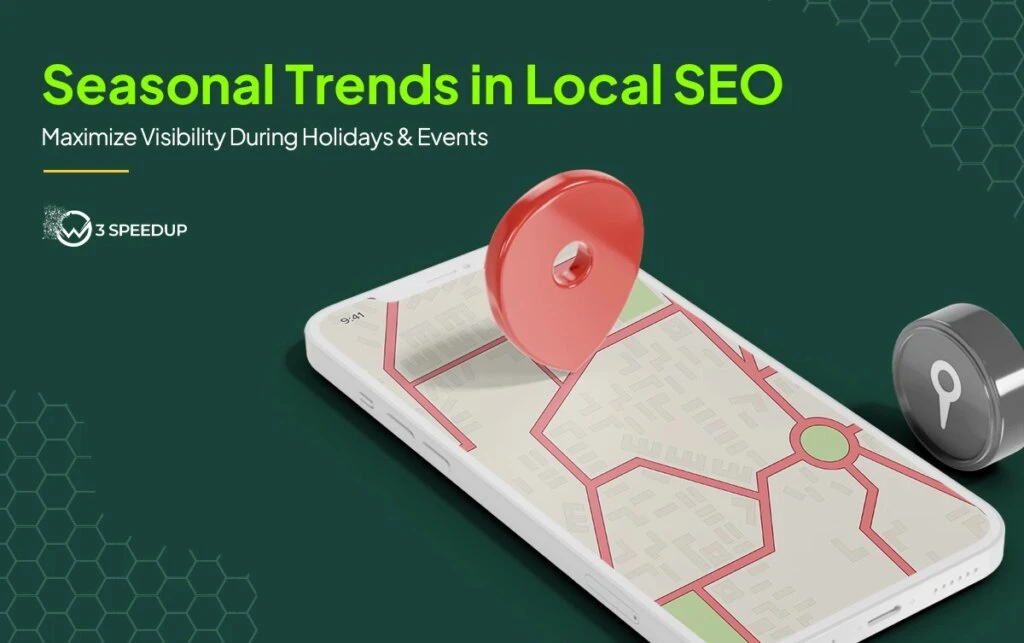In this day and age where people are constantly Googling for products and services in their immediate vicinity, local SEO has emerged as a powerful tool for businesses to connect with their community and attract nearby customers. One of the most effective strategies within local SEO is leveraging seasonal trends, holidays, and events. These occasions offer unique opportunities for businesses to enhance their visibility and engage with potential customers in a timely and relevant manner.
This blog post delves into how businesses can capitalise on these opportunities, with insights tailored to the unique landscape of local SEO.
Understanding Seasonal Trends in Local SEO
Seasonal trends refer to the predictable fluctuations in consumer behaviour and search patterns related to specific times of the year. These can include major holidays like Christmas and Easter, local events such as festivals or sports games, and even weather changes that influence consumer needs and preferences.
To effectively leverage these trends, businesses need to:
- Identify Relevant Seasons and Events: Understand the key holidays, events, and seasons that are significant to your target audience. This involves both global events (like New Year’s Eve) and local happenings (such as a city’s annual fair).
- Analyse Search Behaviour: Use tools like Google Trends to monitor changes in search behaviour related to these events. This helps in identifying keywords that gain traction during specific times.
- Plan Content Accordingly: Develop a content calendar that aligns with these trends, ensuring that you have timely and relevant content ready to go live when search interest peaks.
Crafting Seasonal Content
Creating content that resonates with seasonal trends is crucial for capturing search traffic. Here are some tips for crafting effective seasonal content:
- Blog Posts and Articles: Write blog posts that address seasonal topics and provide value to your audience. For instance, a retail store could publish a guide on “Top 10 Christmas Gifts for 2024”, while a local restaurant might share “Best BBQ Recipes for Australia Day”.
- Local Event Guides: Create comprehensive guides for local events, highlighting why they are special and providing useful information such as dates, locations, and tips for attendees. This not only positions your business as a local expert but also helps attract local search traffic.
- Seasonal Promotions: Promote special offers and discounts that align with holidays and events – this could be through blog posts, social media, and your website. For example, a gym might offer a “New Year, New You” discount to attract those with New Year’s resolutions.
- Visual Content: Incorporate seasonal themes into your visual content, including images, videos, and infographics. Seasonal visuals can make your content more engaging and shareable, increasing its reach.
Optimising for Local Search
To ensure that your seasonal content is easily discoverable, it’s important to optimise it for local search. Here’s how:
- Local Keywords: Incorporate local keywords and phrases that are relevant to your business and the seasonal event. For instance, if you’re a florist in Perth preparing for Valentine’s Day, use keywords like “Perth Valentine’s Day flowers”. For a highly effective local SEO strategy, you might consider partnering with a professional Perth SEO agency for invaluable expertise and insights.
- Google My Business: Keep your Google My Business listing updated with seasonal information, such as special hours during holidays, event participation, and promotions. This enhances your visibility in local search results.
- Local Backlinks: Seek backlinks from local websites, event pages, and community blogs. This boosts your site’s authority and helps it rank higher in local search results.
- Mobile Optimisation: Ensure your website is mobile-friendly, as many users search for local information on their smartphones, especially when on-the-go during events.
Leveraging Social Media
Social media plays a crucial role in amplifying your seasonal content. Here’s how to make the most of it:
- Timely Posts: Share your seasonal content and promotions on social media platforms at the right times. Use scheduling tools to ensure your posts go live when your audience is most active.
- Engaging Stories: Utilise features like Instagram Stories or Facebook Stories to create engaging, time-sensitive content. This can include behind-the-scenes looks at how your business is preparing for an event, special promotions, or live coverage from local happenings.
- Hashtags: Use relevant and trending hashtags to increase the visibility of your posts. For example, during the Perth International Arts Festival, use hashtags like #PIAF2024 to reach a broader audience.
Measuring Success
To gauge the effectiveness of your seasonal SEO efforts, track key metrics such as:
- Website Traffic: Monitor changes in traffic to your seasonal content pages.
- Engagement: Measure likes, shares, and comments on your social media posts.
- Conversions: Track the number of leads or sales generated from your seasonal promotions.
By analysing these metrics, you can refine your strategies for future seasonal campaigns.
Ready to get started?
Seasonal trends, holidays, and events provide a wealth of opportunities for businesses to enhance their local SEO efforts. By understanding your audience’s seasonal behaviours, crafting relevant content, optimising for local search and leveraging social media, you can significantly boost your visibility and engagement.
As the digital landscape continues to evolve, staying ahead of seasonal trends can help your business remain competitive and connected to your community. By embracing these strategies, you not only enhance your local SEO but also build a stronger, more engaged relationship with your audience year-round.
 Christmas Mega Sale – Enjoy Up to 50% OFF on Every Plan!
Christmas Mega Sale – Enjoy Up to 50% OFF on Every Plan! 



